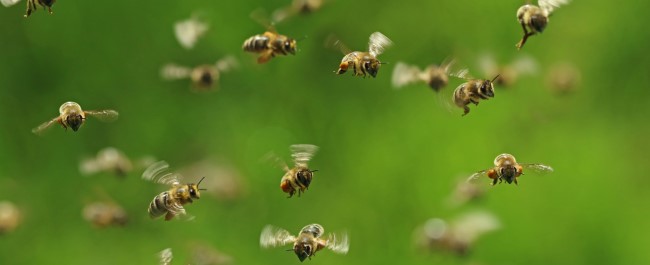Harmonious coexistence: Enhancing plant pollination with micro-drone swarms while safeguarding insect populations

Pollination is crucial for preserving plant communities. But while the planet’s population continues to rise, increasing the need for pollinators for food production, pollinators are declining. Could innovative robotics technology address this challenge?
The challenge
Pollination is a crucial ecosystem service vital for preserving plant communities, both wild and agricultural. With pollinator species populations declining, plant reproduction suffers, leading to a loss of biodiversity and impacting dependent ecosystems.
Furthermore, as the planet’s population continues to rise, there is an increased need for pollinators for food production. Traditional artificial pollination is slow and time-intensive, limiting its scalability. While hiring beehives is an option, it may not suit all plant species and has been shown to spread disease, further contributing to the decline of natural pollinator species.
What we're doing
Our project seeks to investigate the environmental, technological and ethical implications of using innovative robotics technology to address these challenges.
We aim to investigate and understand bio-inspired methods employed by insects, particularly bees, for pollination and apply those using swarms of micro-UAVs, as a novel approach for pollination and pro-pollinator seed dispersion in diverse indoor and outdoor environments.
By identifying specific niches where robotic technologies complement biological systems, we aspire to enhance pollination of pro-pollinator species and build more sustainable agricultural pollination techniques, whilst boosting insect populations, pro-pollinator plants, and ecosystems.
How it helps
Our cross-disciplinary team comprises Ecologists, Biologists, and Roboticists from the PROTEAS group at the Bristol Robotics Laboratory, along with collaborators from ecology and environmental groups. Together, we will deliver an informed proposal for micro-drone swarm-based pollination and showcase a prototype system. Through this research, we will quantifiably improve pollination efficiency and contribute to the preservation of vital ecosystems, while upholding ethical and sustainable practices.
We envision a future where cutting-edge robotics coexists harmoniously with natural pollinators to safeguard the diversity and resilience of our plant ecosystems.
Investigators
- Alex McConville, School of Engineering Mathematics and Technology
- Professor Chris Preist, School of Computer Science
- Professor Jane Memmott, School of Biological Sciences
- Dr Christoph Grueter, School of Biological Sciences
- Hannah Romanowski, School of Biological Sciences
- Professor Tom Richardson, School of Civil, Aerospace and Design Engineering
- Dr Sabine Hauert, School of Engineering Mathematics and Technology
- Khulud Alharthi, School of Computer Science
- Henry Hickson, School of Engineering Mathematics and Technology
- Avgi Stavrou, School of Engineering Mathematics and Technology
- Mickey Li, School of Engineering Mathematics and Technology
- Georgios Tzoumas, School of Engineering Mathematics and Technology
- Elliot Scott, School of Engineering Mathematics and Technology
- Matimba Swana, School of Engineering Mathematics and Technology
- Daan Scheepens, University College London
- Kirsten Syris, University of Reading
 Lead researcher profile
Lead researcher profile
Alex McConville, School of Engineering Mathematics and Technology
Related research centres
Partner organisations
- University College London
- University of Reading